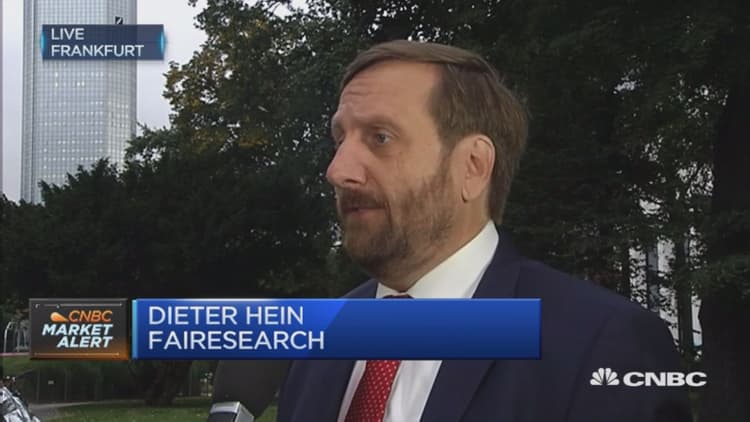
The International Monetary Fund might see Deutsche Bank as the "most important net contributor to systemic risks in the global banking system," but many experts and analysts in the industry are playing down comparisons with the dramatic collapse of Lehman Brothers eight years ago.
"We think Deutsche has a business model viability issue, but it does not have a near-term funding problem," Stuart Graham, the CEO of independent financials research house Autonomous, said in a note on Thursday.
There are concerns that Deutsche Bank needs to raise capital after the U.S. Justice Department (DOJ) suggested it pay $14 billion to settle a number of investigations related to mortgage securities. Initial worries about Deutsche Bank actually surfaced earlier in the year, with investors detailing concerns over its exposure to the energy sector and a possible cash crunch.
The share price saw another major leg lower on Thursday after a Bloomberg report said a small number of hedge funds were trimming their exposure at the German bank. Deutsche Bank told CNBC this is "typical" when doing business with hedge funds, however.
Nonetheless, analysts talk about a favorable balance sheet and liquidity reserves at the German lender, and the rebalancing that has taken place in Europe over the last few years.
A quick look at its second-quarter earnings - released in July - shows it has liquidity reserves of around 220 billion euros ($246 billion) and a liquidity coverage ratio (LCR) of around 120 percent. This LCR is a regulatory measure designed to ensure a lender has a decent stock of high-quality liquid assets (HQLA) which can be sold without loss to meet its 30-day liquidity requirements under a stress scenario.
"As at (the fourth quarter of 2015), 94 percent of Deutsche's liquidity reserve was formed of HQLA. For historical context, Lehman's liquidity reserve in 2007 was around $45 billion, while Deutsche's was 65 billion euros. A lot has changed since then for the better," Graham added in his note.
"Perversely, a liquidity panic could even strengthen its bargaining hand with the DOJ. Does the DOJ want to run the risk of being branded by European leaders as responsible for inadvertently bringing down the fourth most systemic bank in the world?"
Screaming buy?

Other analysts point to a potential backstop from the German government, even though lawmakers in the country have continued to deny the notion this week. Gildas Surry, a senior analyst at Axiom Alternative Investments, told CNBC Friday that there's a lot of "overblown, overdone headlines on this topic" and suggested that Deutsche Bank is a victim of its "own disclosure," with U.S. banks not having to abide by similar transparency requirements.
Indeed, he agreed on CNBC that the stock was actually a "screaming buy".
Guy de Blonay, director of Jupiter Asset Management, meanwhile, told CNBC Friday that the liquidity issue was "non-apparent" and said that regulators had done a lot to over the past few years to address the systemic risk of the bank.
Goldman Sachs analysts on Thursday iterated that Deutsche Bank's liquidity position was stable and highlighted that the European Central Bank was always available to lend money to these banks at record low rates.
Macroeconomic research firm Capital Economics also agreed that Deutsche Bank's troubles were unlikely to spark wider crisis. It said this is not the next Lehman Brothers' moment for the global financial system and its troubles are unlikely to trigger a German recession.
"But recent developments have highlighted the fragility of the euro-zone banking sector yet again and suggest that weak lending growth will continue to weigh on the region's prospects," the firm conceded in a note Thursday.


